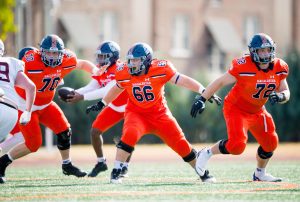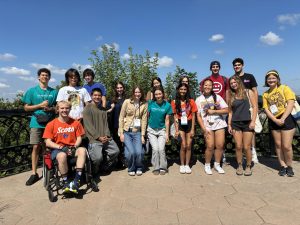Crystal Moten featured in El-Kati Distinguished Lectureship

November 11, 2021
On Friday, Nov. 5, the American Studies department hosted a lectureship at Macalester in honor of Mahmoud El-Kati, an influential Black community leader and former Macalester professor. The lectureship position gives a speaker the platform to share their academic knowledge. This year’s lecture was given by Dr. Crystal Marie Moten, a curator of African American history in the National Museum of American History’s Division of Work and Industry, and also a former Macalester professor. She spoke about her upcoming book “This Woman’s Work: Black Women’s Intellectual and Economic Activism in Postwar Milwaukee.”
The Mahmoud El-Kati Distinguished Lectureship is given every two years, with the goal of sharing knowledge with the broader community.
Moten’s lecture was centered on the history of the Milwaukee Young Women’s Christian Association, which she argued was an organization integral to Milwaukee’s Black population, and that the stories are “historically relevant reflections for troubled times.” The YWCA was situated on Walnut Street, a hub for Black-owned businesses and communities, which Moten compared to Rondo, a Black neighborhood in St. Paul, in regards to its importance.
She linked her lecture to the many crises currently unfolding, including a global health crisis, an environmental crisis and the “intensification of racism, misogynoir.” She organized her lecture into three parts: “records, ruptures, refusals.”
Her lecture focused on the work of two Black women, Bernice Copeland Lindsay and Nana Reed Baker. These women were the employees of the Milwaukee YWCA during the post-war period in the 40s and 50s. She talked about their backgrounds, philosophies, and the work they did to uplift their community.
Moten highlighted Lindsay’s fortitude in being the first Black woman to graduate from her journalism school. For most of the decade they worked there, Lindsay and Baker were the only employees of an institution that had 10,000 annual visitors. Moten emphasized the difficulty of their work: even through dwindling financial resources and pay discrimination compared to the white employees at other YWCAs, they continued to work for their community.
Sedric McClure, an organizer of the event and the assistant dean for college access, retention and success in the Department of Multicultural Life, explained that El-Kati’s legacy is one that exemplifies community and shared knowledge. The purpose of the lectureship series is to continue his vision.
The evening began with an introduction of El-Kati and his work. Two members of the class of 1974 and 1975 spoke, crediting El-Kati with making them the people they are today. They cited the histories he taught of Black peoples’ contributions to science, business and the arts as particularly important teachings.
El-Kati, known by the community and his students as Elder Mahmoud El-Kati, taught at Macalester from 1970 to 2003. He was an important impetus for the creation of the American studies department, which was created after he left Macalester.
“[He taught] in high schools and community centers and private residences and religious organizations,” McClure said. “Wherever he had an opportunity to teach, he did it. Because what he was trying to do is to bring about the connection.”
Former student Melvin Collins ’75 said that El-Kati was “ahead of the time and ahead of the curve of our struggle.”
He also compared El-Kati’s role to that of a griot, who, in West Africa, is a person who preserves oral tradition and history. McClure echoed this sentiment, underscoring the respect students and friends of El-Kati have for his knowledge base and teaching ability.
President Suzanne Rivera also spoke briefly. She thanked El-Kati, who was in attendance, for his work and announced the commissioning of a portrait of El-Kati for Kagin Commons. It will be painted by Leslie Barlow, an artist with works in the Minnesota Museum of American Art and the Weisman Art Museum.
This year, aspects of the event were smaller, due to the pandemic and extenuating circumstances. Typically, the lecture is preceded by the Kente Summit for Collegiate Black Men, an event for Black men attending Minnesota private colleges and universities. The lectureship usually brings the lecturer to centers across the Twin Cities, such as religious organizations, that wouldn’t otherwise have the funds to get an acclaimed speaker. This year, Macalester’s involvement had to be shortened to just the evening lecture. Even so, the turnout showed a diversity of ages, and people from outside the campus community attended.
McClure also spoke of hopes for the future of the lectureship if donations allow them to expand the program. Instead of the event ending after the lecture, there could be a reception with intergenerational conversation.
“I would say to people who are interested in racial justice initiatives, put [your] dollars in this lectureship,” American studies professor Duchess Harris, an organizer of the lectureship, said. “Clearly you see the result of what happens when that money is there.”
El-Kati ended the night with his thoughts and advice for the community.
“Race is a myth. Racism is a reality. A myth can create a reality,” El-Kati said. “Everyone in America is affected by the doctrine of white supremacy. I don’t want to see another generation of white children being trapped in that doctrine.”











